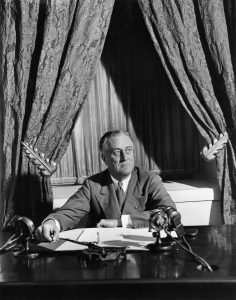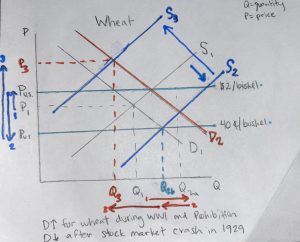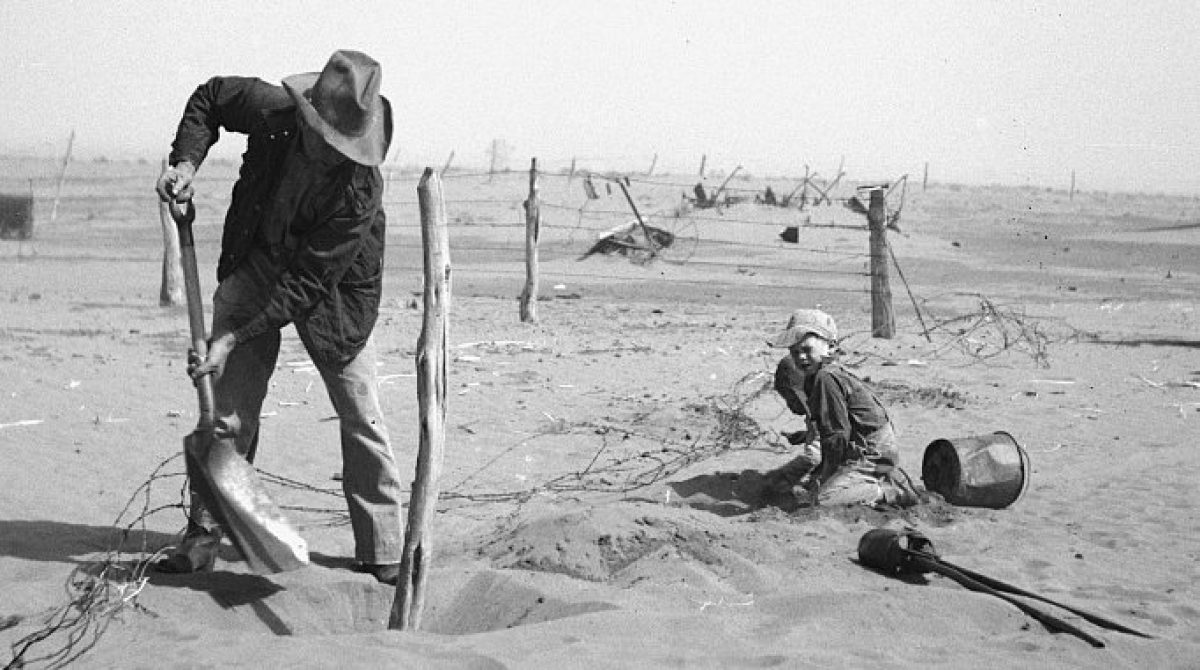“On Drought Conditions”
During these public broadcastings, ranging 11-44 minutes, President Franklin Delano Roosevelt (FDR) clearly demonstrated his administration’s focus on surviving the Great Depression and the Dust Bowl. FDR was the first president to use Fireside Chats as a way to communicate with the greater United States population. Radio broadcasts reached anyone with a radio in the 1930s, and it was a real-time method to update the American people with Washington D.C.’s concerns and policy changes that would directly affect families all around the country. This section discusses the Fireside Chat delivered on Sunday, September 6, 1936. Its duration was 26:49 minutes.

FDR began his radio broadcast that Sunday evening by sharing his grief about the state of the environment and its devastating effect in the nine states that he witnessed during his travels through the Great Plains. He saw “cattlemen… compelled to sell all but their breeding stock” due to the “lack of grass” and “lack of winter feed” (FDR 1936). He then pivoted and focused on instilling confidence in the American people, declaring:
Yet I would not have you think for a single minute that there is permanent disaster in these drought regions, or that the picture I saw meant depopulating these areas. No cracked earth, no blistering sun, no burning wind, no grasshoppers, are a permanent match for the indomitable American farmers and stockmen and their wives and children who have carried on through desperate days, and inspire us with their self-reliance, their tenacity and their courage. It was their fathers’ task to make homes; it is their task to keep those homes; it is our task to help them with their fight.
He goes on to address many American farmers’ concerns about feeding their families and working for a livable wage by emphasizing that the United States is comprised of many communities that must work together to succeed. Uniting people at a time of crisis was paramount, and FDR prioritized creating this unity as he announces:
Every state in the drought area is now doing and always will do business with every state outside it. The very existence of the men and women working in the clothing factories of New York, making clothes worn by farmers and their families; of the workers in the steel mills in Pittsburgh, in the automobile factories of Detroit, and in the harvester factories of Illinois, depend upon the farmers’ ability to purchase the commodities they produce. In the same way it is the purchasing power of the workers in these factories in the cities that enables them and their wives and children to eat more beef, more pork, more wheat, more corn, more fruit and more dairy products, and to buy more clothing made from cotton, wool and leather. In a physical and a property sense, as well as in a spiritual sense, we are members one of another.
Further, FDR understood that the Dust Bowl was not solely caused by a drought in the Great Plains. He educated the American people on the differences between grassland and farmland and the ways to remedy the land that had been poorly treated in the decades prior to the drought. FDR applauded farmers in the Great Plains for adapting their farming methods for the betterment of the land and themselves when he points out:
In the drought area people are not afraid to use new methods to meet changes in Nature, and to correct mistakes of the past. If overgrazing has injured range lands, they are willing to reduce the grazing. If certain wheat lands should be returned to pasture they are willing to cooperate. If trees should be planted as windbreaks or to stop erosion they will work with us. If terracing or summer fallowing or crop rotation is called for, they will carry them out. They stand ready to fit, and not to fight, the ways of Nature… With this fine help we are tiding over the present emergency. We are going to conserve soil, conserve water and conserve life. We are going to have long-time defenses against both low prices and drought. We are going to have a farm policy that will serve the national welfare. That is our hope for the future.
When the stock market crashed in 1929 and a bushel of wheat’s price decreased, farmers lost revenue but made up for it by producing more wheat as rain fell steadily. When the drought began in 1931, farmers could no longer sustain harvesting large amounts of wheat, so its supply decreased. Following the thory of supply and demand, the price of wheat subsequently increased. American consumers in cities as well as farmers in rural plains suffered due to the previous land misuse and current uncontrollable drought as shortages occurred and prices changed.

FDR acknowledged the need to set price floors and ceilings so that both consumers and producers would have equitable price and food standards, stating:
The maintenance of a fair equilibrium between farm prices and the prices of industrial products is an aim which we must keep ever before us, just as we must give constant thought to the sufficiency of the food supply of the nation even in bad years. Our modern civilization can and should devise a more successful means by which the excess supplies of bumper years can be conserved for use in lean years.
The President concluded his chat by discussing the unemployment rate and importance of all types of labor in the United States, not only white-collar jobs. FDR’s rhetoric reminded people that they were all humans who required support and care from others. His message of serving one’s neighbor strongly shined through the radio broadcast as he reveals and urges:
Tonight I am announcing the allocation of two and a half million dollars more to enable the Employment Service to make an even more intensive search then it has yet been equipped to make, to find opportunities in private employment for workers registered with it…Tonight I urge the workers to cooperate with and take full advantage of this intensification of the work of the Employment Service…We do not surrender our responsibility to the unemployed. We have had ample proof that it is the will of the American people that those who represent them in national, state and local government should continue as long as necessary to discharge that responsibility. But it does mean that the government wants to use resource to get private work for those now employed on government work, and thus to curtail to a minimum the government expenditures for direct employment…Tonight I ask employers, large and small, throughout the nation, to use the help of the state and Federal Employment Service whenever in the general pick-up of business they require more workers… There is no cleavage between white collar workers and manual workers, between artists and artisans, musicians and mechanics, lawyers and accountants and architects and miners.
At a time where people felt hopeless and abandoned by God, FDR used the Fireside Chats to comfort his citizens and announce important relief programs that would serve them. He also emphasized the importance of unity and teamwork across the fifty states. His efforts to reassure the public and care for the common good did not go unnoticed as the American people reelected him to the highest office in the land not once or twice, but three times.
